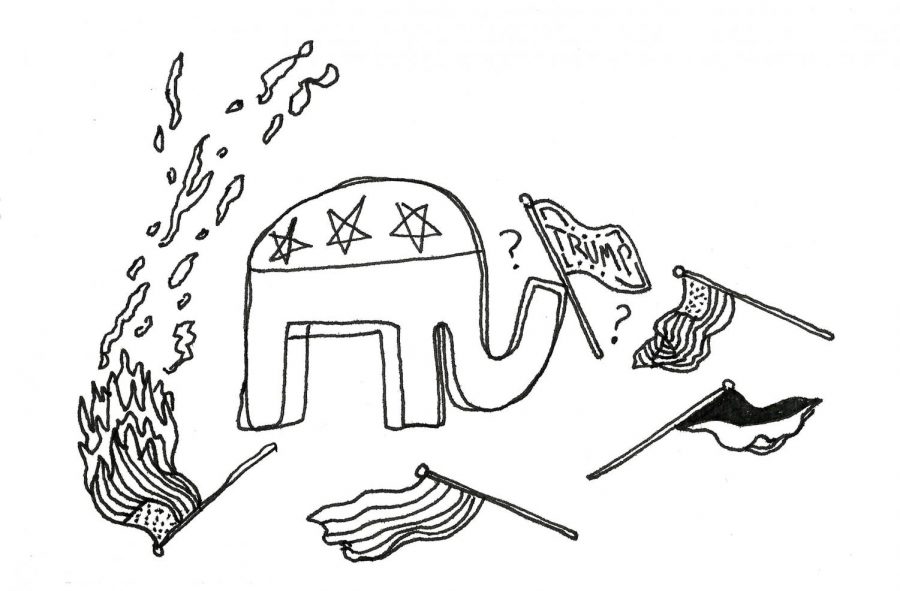In the abandonment of iconolatry; what are the next moves for the GOP?
The horizon is clouded as to what a post-Trump political era could entail
Photo Samuel Elliott
Illustration depicting the GOP, whose reputation has changed from past years.
January 19, 2021
As the president’s fateful end of term draws nearer, a question is growing for the Republican Party: what now?
For the past four years, the party has slowly abandoned the use of platform and policy, instead relying upon the loyalty of half the country to a single man and his three main prerogatives: surface-level populism, strong-armed economic protectionism and isolationism and vehement demonization of the opposition.
Overshadowed by the commercial fervour fated to surround the actions of a reality-star-turned-politician, the GOP was able to pass a plethora of policies and laws, eased in part by a Republican-led congress. This included everything from a controversial 2017 tax overhaul that favoured high incomes, to a surge of abortion regulation bills in states like Alabama and Iowa.
But while domestic and social conservatism was preserved rather faithfully during the Trump tenure, the party’s traditional economic stance of laissez-faire action and fiscal conservatism has been effectively abandoned, evident by excessive and brutish uses of tariffs and a ballooning national debt. Even still, more and more policies have been remoulded in Trump’s image. The moderate immigration reforms of the Bush era were replaced with staunch isolationism and xenophobia; the Reaganite disposition to animosity with dictatorial foreign leaders has given way to attempted amicability with figures such as Putin and Kim Jong-Un.
Case in point, the Republican Party is far removed from the party it had once been 20 years ago. And with the political fracturing following the events at the Capitol building earlier this month, the denouncing of Trump’s actions by some Republicans seems but a limp realization that the political media monster they created might cost the party more elections, short of condemning and making reparations for the inciting and heinous actions themselves.
As it stands now, there are really three main options for the GOP, going into the next few years:
- Replacement: the party fared quite well in the 2016 election simply because of the magnitude that such a radical individual has on the average voter. Trump represented everything no one saw in politics—loud, coarse, indignant, self-confident; the ultimate Washington outsider. So a sensible option could be to just move on to the next big political voice and turn him into another figurehead to be venerated. However, the “creation-destroys-its-creator” dynamic foretold by some to bring the fate of both Trump and the GOP very nearly became reality this month, and with figures like Josh Hawley getting disowned after their attempts to usurp the throne, it’s safe to assume that the Republican Party is decidedly hesitant to entertain the chance once more, and likely for the best.
- Reversion: in the eyes of many individuals, such as The Lincoln Project and more traditional conservative voices in congress, the best option to allow for the GOP’s survival would be to simply revert to the run-of-the-mill republican politics of candidates such as Romney and pre-2008 McCain, possibly adding a socially liberal twist to bring in a wider voter base who believe in economically traditional conservative values, but have more modern world-views on issues such as LGBTQ+ rights and immigration. Appealing to the new generation of Republicans has long been hypothesized as a possible breath of fresh air into a tired GOP, and reaching the big cities and suburban neighborhoods is now more important than ever as the idea of abolishing the electoral college begins to make its way into congress, which could be hugely detrimental to the GOP’s tried-and-true method of relying upon rural inland states to vote red.
- Division: undoubtedly the most interesting, albeit unprecedented, option, as it would change one of the strongest-held American traditions of the past hundred years: the two party system. And yet the move is garnering consideration in the eyes of many moderate republican officials, who are not wrong in believing that a large majority of the republican voter base is simply Trump’s voter base; that is to say that if Trump were to abandon the Republican Party, much of his voters would abandon it as well. There is also the possibility that this new “moderate” Republican Party could sway votes from more centrist voters, who voted Democrat in last year’s election simply out of avoidance of Trump’s radicalism. However, to make any meaningful impact a shift to tri- or multi-party systems should be accompanied by a shift to ranked voting, a concept even more foreign to American politics than the abolishment of the electoral college.
But whatever happens next, one thing is certain: this has been an explosive month in politics, and the fallout with settle for years to come. Only time will tell how Republicans choose to deal with the radiation cleanup.





















